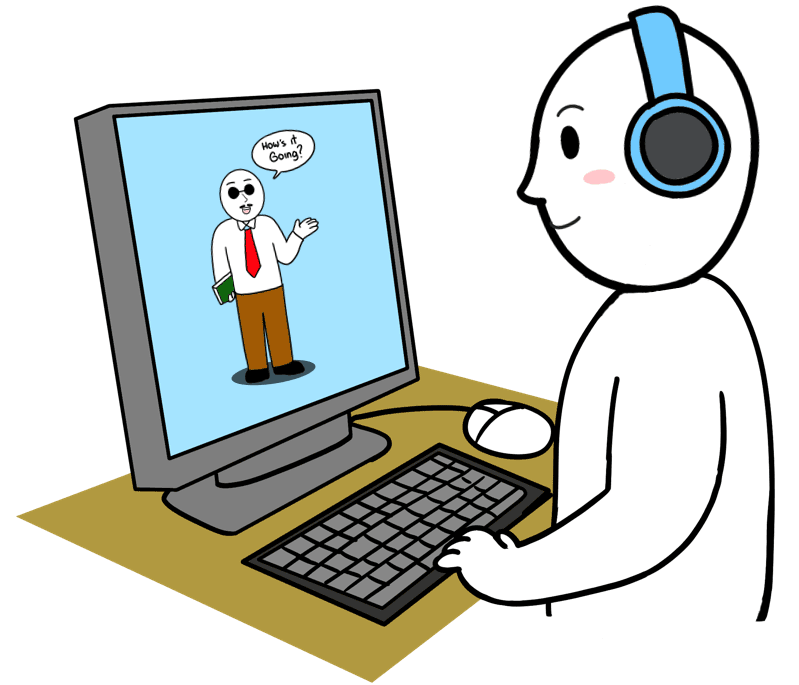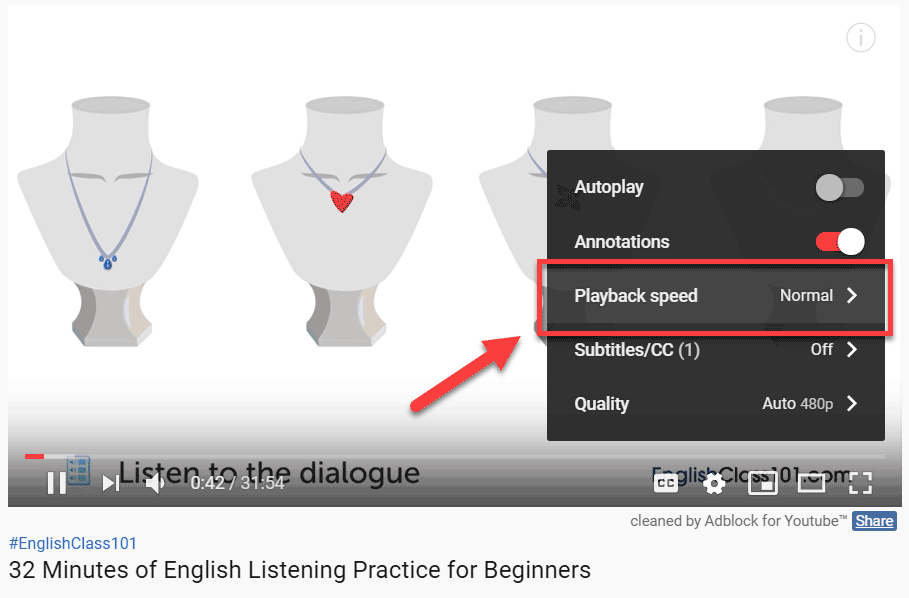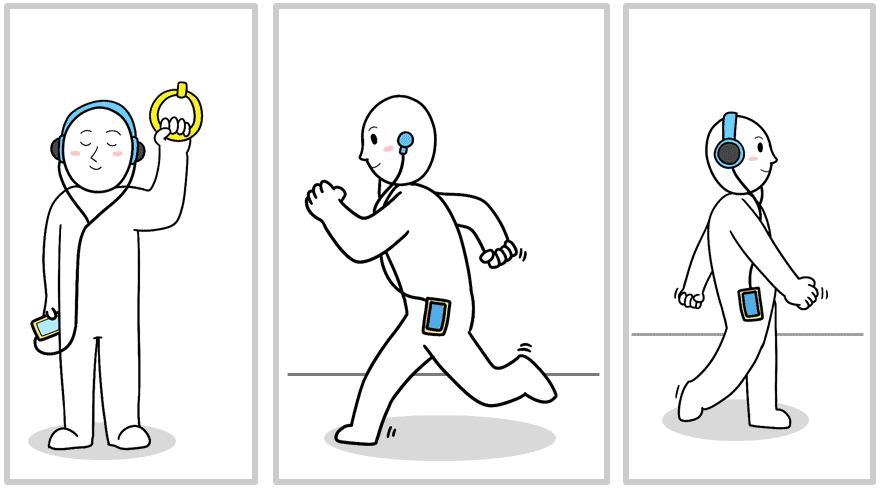Seeing Strange Again: Experimental Documentary as Practice

Are you looking for exercises to practice your English language listening skills?
You've come to the correct identify.
Here are 6 listening exercises for both beginners and intermediates.
English language listening exercises for beginners:
- Exercise #1: Practice with ESL listening lessons (free)
- Practice #ii: Practice listening with TV shows and movies
- Practise #3: Increase your vocabulary through reading
English language listening exercises for intermediates:
- Do #1: Immerse yourself in English language
- Exercise #2: Exam your listening skills
- Exercise #3: Increase the Difficulty & Variety of English language Input
Equally you tin can encounter, there are many means to practice listening. Let's discuss them i by one.
English language Listening Practice:
Beginner Level
Do you accept trouble understanding even irksome speakers?
If and then, yous'll dear the three exercises in this section. (They are beginner-friendly.)
Practice #1: Exercise with ESL Listening Lessons

If y'all're a beginner, it volition be hard to amend your English language listening skills.
Why? Considering almost all English materials (movies, TV shows, YouTube videos, podcasts) are likewise difficult for y'all.
So for someone like you, the best materials to use are listening lessons created for ESL students.
For your convenience, I've listed the best ones below. All the lessons listed here take transcripts/captions, so residual assured yous won't exist confused by the cease of each lesson.
Best English listening lessons:
- Listening Activities| British Council
- 32 Minutes of English Listening Practice for Beginners
- IELTS Listening Practice Exam
- IELTS Listening Practice Test #ii
- IELTS Listening Practice Examination #3
Note that some of these lessons are non necessarily "easy." They can be quite difficult even for intermediates. Merely I included them here anyway considering they provide transcripts.
TIP: When you're practicing with a lesson on YouTube, you can slow downward the video if you have problem understanding.

ESL listening lessons volition aid you go used to natural spoken English (to some degree).
The trouble is that there are very few good listening lessons out there, and so the amount of practice yous can get is limited.
But don't worry. In that location are other ways to exercise listening.
Permit's discuss the next listening exercise.
Do #2: Exercise Listening
with TV Shows & Movies
If yous bask American and British TV series and films, you'll love this exercise.
Starting time, watch a picture show or a TV evidence with subtitles. Every bit you watch it, don't worry virtually listening exercise however. Just relish the prove (and experience complimentary to read the subtitles).

Afterwards you cease the bear witness, watch information technology again without subtitles. This time, the goal of watching is to practice your English listening skills.
Elementary, correct?
Alternatively, yous can also rewatch some of the the quondam shows that you saw a long fourth dimension agone. But this fourth dimension you lot watch them without subtitles.
Watching Shows a 2nd Time Without Subtitles — Is It Necessary?
Now you might be thinking…
"Boo! It's and then tedious to watch something twice! So I'm just gonna spotter shows in one case with subtitles. Hopefully, this'll exist enough to improve my listening comprehension."
Unfortunately, this will not improve your listening much.
If you lot only watch shows with subtitles, you'll be practicing your reading skills instead of listening skills.

Think almost information technology.
When y'all watch a show with subtitles, your brain is working difficult to empathize what's going on.
There are ii ways for the encephalon to practice that:
- Read the subtitles
- Heed to the dialogue
Which choice practice you call back your brain will choose?
The answer is obvious; you encephalon is going to focus on reading the subtitles.
Why? Considering information technology's much easier. The text on the screen is clearly defined, so information technology'due south very easy for y'all brain to procedure.
The sound of people talking, on the other hand, is not always clear. Quite ofttimes yous hear a character whisper, grumble, or talk actually fast. Sometimes the background music is likewise loud. So it's very difficult for your encephalon to figure out what's being spoken.
As a event, you brain volition pay attention to the subtitles, non the sound.
Then when you sentry a subtitled evidence, you're not improving your listening.
You're really improving your reading!
So at present yous might think…
"But equally I'm reading the subtitles, I can 'hear' the dialogue too. Which means I'm also practicing and improving my listening skills!"
No, you're non. You lot may "hear" the dialogue but you are not "listening."
It's like having a news program on in the groundwork while studying. Yous may "hear" the news reporter talking, simply when you lot finish your written report, you can't tell what the news stories were because y'all weren't paying attention.
And then in social club to practise listening effectively, you need to lookout shows a second time without subtitles.
TIP: Subsequently you lot complete a bear witness the beginning time, you don't have to sentry it again immediately (considering the plot is withal fresh in your heed and information technology'll exist very boring).
Look for a while so that you forget some of the details. Y'all can picket other shows in the meantime.
TV Shows VS. Movies — Which is Amend?
Should yous practice listening with TV shows or movies?
Well, information technology doesn't really affair. (You can do both.) What's more important is to watch stuff yous'll enjoy.
That said, if yous want my accept on this, I suggest you focus on TV shows.
The reason? Considering information technology'due south more fourth dimension-efficient. TV shows usually have many episodes. And then when you complete one episode, yous can immediately jump to the side by side.
On the other hand, when you lot finish a pic, you have to make a conclusion nigh what film to spotter next. You may have to spend time reading movie suggestions, synopses, and reviews.
Practice #3: Increment Your English Vocabulary Through Reading

Technically, reading is non a listening do.
Just as a beginner, it'south important to increase your vocabulary as much every bit possible.
Listening and reading, combined together, are the virtually powerful manner to build your English vocabulary.
If you lot do simply ane of them, that'south okay. But if you exercise both, the results will be even amend because you're learning both pronunciation and spelling.
When your vocabulary improves, your listening comprehension will get better as a result.
Nevertheless, it's important the read the right material.
You lot don't want to read something like this:
"Strange Bedfellows!" lamented the title of a recent letter of the alphabet to Museum News, in which a certain Harriet Sherman excoriated the National Gallery of Fine art in Washington for its handling of tickets to the much-ballyhooed "Van Gogh'due south van Goghs" exhibit. A huge proportion of the 200,000 free tickets were snatched upwards past homeless opportunists in the expressionless of winter, who then scalped those tickets at $85 apiece to less hardy connoisseurs.
The linguistic communication of the text in a higher place is old-fashioned. While it may be useful for advanced students, beginners similar yous should focus on something easier.
So what kind of material should y'all read?
I recommend English books or blogs that have similar vocabulary equally spoken English language.
Here's an example:
Are morning people born or made? In my example it was definitely made. In my early on 20s, I rarely went to bed earlier midnight, and I'd almost always sleep in late. I normally didn't first hit my pace each day until late afternoon.

Hither the language is casual and like to spoken English language. Reading content like this will indirectly enhance your listening skills.
If you desire a list of books to read, visit this page.
Can't afford to buy books? No worries. You don't to spend coin on physical books. You can read blogs on topics of your interests instead. (Blogs are proficient considering most of them utilise casual language like to spoken English language.)
English Listening Practice:
Intermediate Level
At this level, yous shouldn't have much trouble agreement native speakers with a standard accent.
Of course, y'all may still observe information technology difficult to understand fast spoken English or uncommon native accents, but that's to be expected at this level. There's however room for comeback.
The exercises in this department are meant to "stretch" your English listening skills.
What do I hateful by stretch?
It ways doing something that'southward a chip across your condolement zone so that you amend faster.
Exercise #1: Immerse Yourself in English language

The practice is unproblematic: you listen to English language at every possible moment.
Information technology may sound uncomplicated, merely it works.
Imagine that yous mind to x,000 hours of English. Practice you think your English listening will improve?
The answer is YES! With that much practice, your comprehension will improve. At that place's no dubiety about it.
But the question is, how the hell are you going to discover the time to do this?
Well, peradventure you don't have to practice for 10,000 hours. (That's almost impossible to do.) But at least you lot should try to practice as much as possible.
How to Find Time to Practise Listening
Have a look at these activities:
- Commuting
- Waiting
- Exercising (walking on a treadmill, riding a stationary bike)
- Walking in the park
- Doing house chores like cooking
These activities have one affair in common: they are "mindless" activities. They don't crave your mental focus or attention.
You probably have to engage in such activities every 24-hour interval. You tin can listen to English during these times.

Suppose you spend 10 hours a calendar week on your daily commute. If yous heed to English during your commute for a year, that's 520 hours of listening practise!
And this is only one activity. Imagine doing this during other activities besides.
Over fourth dimension, the corporeality of listening practice will add up and lead to amazing results.
The all-time thing about this do is that yous don't to have to allocate your gratis fourth dimension to practice it because you'll be practicing during other activities.
If you lot want free English language listening materials, check out this page.
TIP: If you accept a pair of wireless earbuds, it volition exist much easier to apply this strategy because you lot tin do listening while doing something physical like running.

If you don't have a pair of these, I recommend getting them. In that location are plenty of affordable ones out there. (They're worth it!)
Unfortunately, this practice has one limitation.
The limitation is that your listen may wander to random thoughts during the practice. (So you lot'll be "hearing" English instead of listening to English language.)
Simply I think that's okay. Even if you get distracted from time to time, the practice is still worth doing and you will get some results. (At least it'south amend than spending the time on social media or playing games, correct?)
That beingness said, if you have trouble focusing, the adjacent exercise is for you.
Do #2: Examination Your English language Listening Skills
Suppose you're a history teacher. Which approach is the best style to teach history lessons to your students?
- Teach them the lessons without testing their agreement.
- Examination them once after all the lessons are taught.
- Test them before and later on each lesson.
Which i is the most effective?
You think C is the all-time, correct?
Research shows that frequent testing can boost learning effectiveness by more than 100%. Testing motivates learners to put more endeavour into their learning activities.

Y'all tin can apply this insight to your English listening practice.
How? Past testing your listening skills from time to time to run into how good they actually are.
The process can be equally simple as:
- Observe a video or audio with a transcript
- Listen to it. (Don't read the transcript.) Then write downwardly what the speaker is saying
- Compare what y'all wrote with the transcript
You can use a movie, YouTube video, podcast, or something else for this exercise. But I propose you pick something that's hard for you to understand.
So what'south the benefit of doing this?
Firstly, by testing yourself, you'll exist able to appraise the level of your listening skills.
But more importantly, testing is a great way to motivate yourself to practice harder.
If you perform poorly on this test (and you will if the material is difficult), you'll want to do meliorate side by side time. And so you'll get more serious with your listening practice, which volition improve your results.
Exercise #three: Increase the Difficulty and Variety of Your English Input
A big fault intermediates make is that they go along listening to the aforementioned people — people they tin can easily sympathise.

By staying in their comfort zone, they improve very slowly (or they aren't improving at all).
And then if you want to proceed improving, you must:
- Listen to various types of English
- Listen to conversations you detect difficult to sympathise
Hither are some examples:
- British English language
- African-American English
- News
- Documentaries
- Fast speakers
- Topics that you aren't familiar with.
Of course, this will be a difficult practise to practise. Just if you go through with it, you listening skills will become highly reliable.
Beneath you can find lists of diverse YouTube channels featuring different types of spoken English.
Fast speakers:
- Philip DeFranco (news commentary on politics and pop civilisation)
- Smosh (comedy)
- Jeremy Jahns (movie reviews)
- CinemaSins (comedic commentary on movies)
British English language:
- Kurzgesagt – In a Nutshell (animated videos, educational content)
- The Late Belatedly Show with James Corden (talk show, often features guests with regional accents)
- Huw Richards – Grow Food Organically
African-American English:
- Prince Ea (motivational content…more often than not)
News:
- [British] ABC News, Sky News
- [American] CNN, The New York Times
Have a heed to a couple of videos from each of the channels. If it's quite hard to empathize (and if the channel seems interesting to y'all), hit the Subscribe push button.
Be prepared to have trouble understanding some of this content. (That's the betoken of this exercise.) The more you're exposed to difficult English, the easier it becomes.
REMINDER: You lot tin reduce the playback speed of YouTube videos if y'all have trouble understanding.
Action Plan for Your
English Listening Practice

You've learned 6 ways to develop your listening skills in English.
At present it'due south time to take action.
If you lot're a beginner, practice these beginner-friendly exercises:
- Use listening lessons for ESL students
- Watch TV shows and movies with and without subtitles
- Read in English to learn new vocabulary
Experience free to allocate fourth dimension to do these exercises however you want. For example, y'all might practice exercise #1 for two weeks, then practice exercises #2 and #3 at the same time for three months.
If you are an intermediate, yous can besides exercise exercises #2 and #three of the beginner's level. These exercises are beneficial no affair what level yous're at.
But if you lot want to take your English listening skills to the next level, here are the more advanced exercises:
- Mind to English during "mindless" activities
- Exam how well you lot can understand difficult English
- Heed to different types of English
Just like beginners, you lot can allocate time for the exercises still you desire.
But call up that if y'all want to improve quickly, y'all must listen to something a bit challenging to empathize.
However, be sure not to listen to stuff that's also hard that you understand nothing at all. (You should at least be able to sympathise "the gist" of the conversation — the master idea.)
Thanks for reading. I promise you lot discover these practice ideas useful.
Improving English listening skills takes time, so please be patient. If you're consistent with your English listening practice, you'll definitely improve.
Source: https://engfluent.com/english-listening-practice/
ارسال یک نظر for "Seeing Strange Again: Experimental Documentary as Practice"